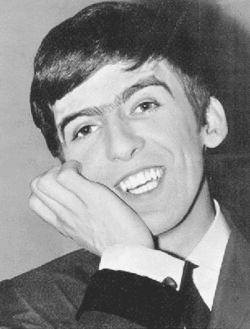I Should Have Known Better
Album: A Hard Day’s Night
Written by: John
I was once at the family Christmas party of a close friend, listening to timeless tunes and discussing the artists that created them, when the Beatles came on. Some random aunt’s new boyfriend, a beer-bellied hair metal remnant, chimed in to let us know that they were merely a boy band.
“Four handsome guys from England who just happened to get lucky and hit it big,” he put it.
Now, there are several layers to that idiot cake, and George’s eyebrows beg to differ…
You’re gonna need “Something” special on that record to hit number 1, my man.
…but let’s just cover the part that’s most pertinent to “I Should Have Known Better.”
Truth be told, the Fab Four did start out as a teenybopper pop band that was most interested in selling hit singles and achieving unrivaled popularity. The toppermost of the poppermost, they famously called it.
That original idea, a humble one compared to the artistic heights they would eventually reach, can be seen quite clearly on their first three albums. Don’t be fooled though, a deeper analysis of the original works within will show that there was something special going on in the confines of those sunshine melodies and lovey dovey lyrics. They are epically well-written pop songs, historically important within the context of western popular music.
“I Should Have Known Better”, a track on the band’s third studio album, A Hard Day’s Night, is a shining but overlooked example of exactly this.
This track, with its tasty harmonica intro and (ever so slightly) more introspective lyrics, is considered one of the earliest Dylan-influenced tunes written by John.
Bob Dylan: not a teenybopper.
It may sound like an average little pop tune, but pick up an acoustic guitar and strum along to that twice-used bridge (apparently not a chorus) if you can.
That when I tell you that I love you, oh…
It’s a thing of true beauty. Complex and unusual and pitch perfect.
I have often found that the brilliance of Beatles music is amplified exponentially when you sit down to learn it on the guitar. The bridge of “I Should Have Known Better” is a perfect example of this phenomenon. It’s a long and uncommon progression that contains one of the band’s most defining signature moves: using a 7th chord in a way that sounds Beatles-y rather than bluesy. What seems like your typical catchy pop tune is really a master class in songwriting that had almost no precedent and still continues to elude comparison today.




